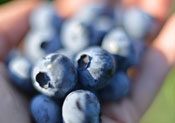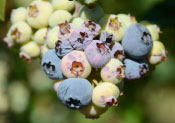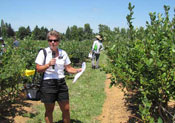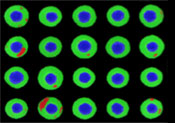USHBC Backing Health-Benefits Research
The U.S. Highbush Blueberry Council is continuing to back and promote research into the health benefits of consuming blueberries.
In a presentation at the 2019 Oregon Blueberry Conference, Dr. Leslie Wada, health research administrator for the USHBC, said several projects are ongoing and more are scheduled that show the benefits of blueberry consumption on physical and mental health.
Significant interest in the health benefits of consuming blueberries dates to 1998, Wada said, when a study looking at antioxidant activities of fruits and vegetables found blueberries were a rich source of antioxidant activity.
“This generated a lot of interest in blueberries with both the scientific community and with the public,” Wada said.
 |
Dr. Leslie Wada, health research administrator for the USHBC. |
At about the same time that study was released, another study was looking at the cognitive effects of consuming blueberries. The cognitive study, which involved feeding mice a diet containing blueberries, showed blueberries helped protect their cognitive abilities.
More animal studies confirmed the initial findings, and research was soon expanded to human subjects. Findings from a study at Tufts University found that eating the equivalent of one cup of blueberries a day can increase some aspects of cognition in older adults.
The studies have helped position blueberries as a super food in what has become a leading trend in the consumer media, namely the effect of food on brain health.
The USHBC today is participating in two studies involving brain health by supplying blueberries or rebates for the purchase of blueberries to test subjects. One of the studies, which has yet to kick off, includes 2,500 subjects, half of which will be encouraged to consume blueberries and other foods being looked at for brain health and to make other lifestyle changes.
“These are different than our usual studies in that they are looking at the effect of a whole diet, rather than just blueberries,” Wada said. “However, they are very expensive, very large studies that we couldn’t have conducted on our own. So, regardless of the difference, we are very pleased to have a seat at the table, or a better way of looking at it is, we have a share of the stomach of these research subjects.”
USHBC also is involved in studying the benefits of blueberry consumption on insulin activity, Wada said.
In several studies to date, subjects given blueberries (both animal and human) were more responsive to insulin and didn’t need as much insulin to keep their blood glucose constant. She added, however, that not all studies have been able to show the same effect, noting the effect can be dependent on subject population.
USHBC also recently funded a study with men with type 2 diabetes. “We are looking forward to seeing how these types of subjects respond to a blueberry supplemented diet,” she said.
Another area of research USHBC is involved in involves cardiovascular health. Two recent studies showed decreases in blood pressure with blueberry consumption, she said, and both of the studies were mentioned in articles in consumer magazines.
“So, we are getting our message out to the public,” she said. Wada added that USHBC views promoting study findings as part of its charge. “Funding research is only part of our job. Another important part is communicating results to the scientific community and the general public.”
One recent study, called the Circle study, was a six-month study that included more than 110 male and female subjects between the ages of 50 and 75 who had metabolic syndrome, which is a combination of conditions including high blood pressure, obesity and abnormal lipid levels.
Researchers found that those who consumed the equivalent of a cup of blueberries a day showed significant improvement in vascular and arterial function.
“In other words, their blood vessels had more elasticity, which allows for better blood flow,” Wada said. “This is very important, as these functions are associated with a reduced risk of a cardiovascular event, such as heart attack or stroke.”
Wada noted that researchers did not find the same effect in subjects fed the equivalent of a half-a-cup of blueberries a day.
“Nevertheless, this was a major undertaking, and there are more results from this study that are still being analyzed,” she said. A media event in New York was planned around the study’s findings in late February. The study is expected to be published soon.
Wada also noted that the 8th Biennial Berry Health Benefits Symposium will be held in Portland, May 7-9. Location of the symposium, a gathering of top researchers into the effects of berries on human health, rotates biennially. It was held in Pismo Beach, California, in 2017 and Madison, Wisconsin, in 2015.
| SPRING 2019 |









